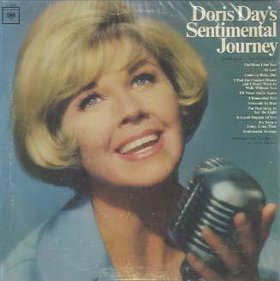
Doris Day was an American actress and singer. She began her career as a big band singer in 1939, achieving commercial success in 1945 with two No. 1 recordings, "Sentimental Journey" and "My Dreams Are Getting Better All the Time" with Les Brown and His Band of Renown. She left Brown to embark on a solo career and recorded more than 650 songs from 1947 to 1967.

Joseph Harry Fowler Connick Jr. is an American singer, pianist, composer, actor, and former television host. As of 2019, he has sold over 30 million records worldwide. Connick is ranked among the top 60 best-selling male artists in the United States by the Recording Industry Association of America, with 16 million in certified sales. He has had seven top 20 US albums, and ten number-one US jazz albums, earning more number-one albums than any other artist in U.S. jazz chart history as of 2009.
"Everybody Loves a Lover" is a popular song which was a hit single for Doris Day in 1958. Its lyricist, Richard Adler, and its composer, Robert Allen, were both best known for collaborations with other partners. The music Allen composed, aside from this song, was usually for collaborations with Al Stillman, and Adler wrote the lyrics after the 1955 death of his usual composing partner, Jerry Ross.
"Lullaby of Broadway" is a popular song with music written by Harry Warren and lyrics by Al Dubin, published in 1935. The lyrics salute the nightlife of Broadway and its denizens, who "don't sleep tight until the dawn."

I Have Dreamed is an album recorded by Doris Day in May 1961 and issued by Columbia Records on August 14, 1961 as catalog number CS 8460. Doris Day was backed by Jim Harbert's Orchestra and the cover photography was by Leo Fuchs.
"A Hundred Years from Today" is a popular song published in 1933 with music by Victor Young and lyrics by Ned Washington and Joe Young. The song was included in the London production of Lew Leslie's Blackbirds of 1934.
"Something Wonderful" is a show tune from the 1951 Rodgers and Hammerstein musical The King and I.

That's The Way God Planned It is the fourth studio album by American musician Billy Preston, released in August 1969 on Apple Records. The album followed Preston's collaboration with the Beatles on their "Get Back" single and was produced by George Harrison. The title track became a hit in the UK when issued as a single. Aside from Harrison, other contributors to the album include Keith Richards, Eric Clapton and Doris Troy.

Young Man with a Horn is an album that was released by Columbia Records in 1950. It features trumpeter Harry James and singer Doris Day performing songs initially recorded for the soundtrack of the film of the same name.

Day by Day is a Doris Day album released by Columbia Records on December 17, 1956. The title is an obvious pun, both meaning "on a daily basis" and "(Doris) Day, in the daytime". The album was issued as Columbia catalog CL-942.
"But Not for Me" is a popular song originally written by George Gershwin and Ira Gershwin for the musical Girl Crazy (1930).

Doris Day's Sentimental Journey is a studio album by American singer Doris Day, released by Columbia Records on July 12, 1965 as a monophonic LP and a stereophonic album. This was Day's final album for Columbia, and her last album of previously unissued material until 1994.
"When You're Smiling" is a popular song written by Larry Shay, Mark Fisher and Joe Goodwin. First published in 1928, it bears resemblance to the Spanish Canción "Amapola" by José María Lacalle García. Early popular recordings were by Seger Ellis (1928), Louis Armstrong (1929), and Ted Wallace & His Campus Boys (1930).

Dusty is the second album of singer Dusty Springfield to be released in the USA. It was issued on the Philips Records label in 1964 and includes Springfield's hit singles "All Cried Out", "I Just Don't Know What To Do With Myself" and the double A-side "Guess Who?"/"Live It Up".

Stay Awhile/I Only Want to Be with You is the first album of the singer Dusty Springfield to be released in the USA. It was issued on the Philips Records label in 1964 and includes Springfield's hit singles "I Only Want To Be With You", "Stay Awhile" and "Wishin' and Hopin'".
The following is a complete discography for American singer and actress Doris Day, whose entertainment career spanned nearly 50 years. She started her career as a big band singer in 1939 and gained popularity with her first hit recording, "Sentimental Journey", with Les Brown and His Band of Renown in 1945. In her solo career, she recorded more than 650 recordings on the Columbia Records label from 1947 to 1967. She was one of the most popular and acclaimed singers of the 20th century.

You Can't Have Everything is a 1937 Fox musical film directed by Norman Taurog and produced by Darryl F. Zanuck. The film stars Alice Faye and Don Ameche, and was the film debut for Gypsy Rose Lee credited as Louise Hovick part of her birth name.

My Heart is the 29th and final studio album by Doris Day, released on September 5, 2011. On September 11, 2011 the album entered the UK chart at number nine, making Doris Day, at age 89, the oldest artist to score a UK Top 10 with an album featuring new material.

Listen to Day is a 1960 album by the American singer Doris Day. The album mostly consists of Day's singles from the 1950s.
What Every Girl Should Know may refer to:












